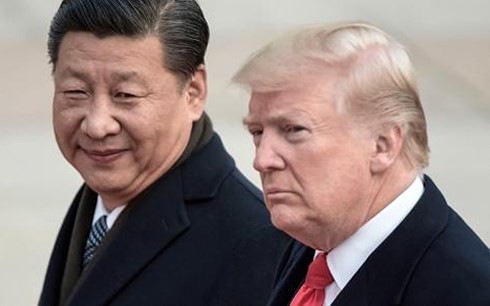(VOVWORLD) -US President Donald Trump threatened to impose a 10 percent tariff on 200 billion USD of Chinese goods, in retaliation against Beijing’s early decision to raise taxes on American goods. New developments show that it’s not easy to de-escalate the trade tensions between the two biggest economies, although they have so far avoided an all-out trade war.
 US President Donald Trump and Chinese President Xi Jinping US President Donald Trump and Chinese President Xi Jinping
|
On Tuesday, Mr. Trump said that it is necessary to act to encourage China to revise unfair regulations, open the market for American goods, and accept balanced trade ties with the US. He has directed the US Trade Representative to identify Chinese goods for a new tariff rate. Mr. Trump said it’s the latest move to hit back at China’s tariff on American goods worth 50 billion USD.
Opposite acts
A month ago, trade officials from both countries issued a joint statement after many tough negotiations in Beijing and Washington, affirming the necessity to implement effective solutions to reduce the US’s trade deficit with China, worth 300 billion USD. The world’s two biggest economies will resolve their economic and trade concerns through active methods.
On May 29, President Trump announced a new tariff worth 50 billion USD on Chinese goods and a limit on Chinese investment in the US’s high-tech industry including technologies relating to the “Made in China 2025” strategy.
The US Department of Commerce began to investigate Chinese goods, with producers of steel propane tanks accused of dumping and unfair subsidies. Washington said the decision aims to protect their domestic technology and intellectual assets from discrimination and certain trade burdens from China.
China has hit back by levying additional tariffs totalling 50 billion USD on American goods, mainly agricultural products, fish, and vehicles.
The US’s breaking of the consensus signed in Washington in May has shocked China and international investors. Analysts say there is disagreement within the US political arena on their trade policy with China.
Investor concerns
The US and China are economically dependent, so the US has few options to prevent Chinese trade without affecting its own. Cargill, the US’s biggest agricultural group, has called on Washington and Beijing to engage in dialogue to save enterprises and farmers from the adverse effects of a trade war. A spokesperson for Archer Daniels Midland said both countries should hold more bilateral talks and China remains an important market for the US’ agricultural products.
Boeing has begun to evaluate the impacts of China’s tariffs. 12.8% of Boeing’s revenue in 2017 came from China and it’s frequently seen as one of the more vulnerable US multinationals in an all-out trade war.
The American Apparel & Footwear Association said China's retaliatory measures could harm American farmers and textile manufacturers and add costs to the industry's supply chain. Its President, Rick Helfenbein, said Congress needs to step in now to end this dangerous obsession.
Since taking office, President Trump has shown a determination to rebalance trade ties with China. The main solution of imposing tariffs has failed to make changes.
Hong Van